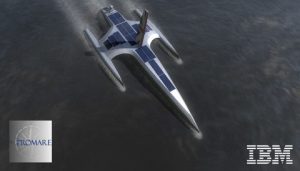IBM: World’s first autonomous research vessel to launch
IBM Boards Mayflower Autonomous Ship Project
IBM Systems, AI, cloud and edge technologies at helm in one of world’s first autonomous transatlantic voyages
Mission to expand humankind’s knowledge of the ocean and remove barriers to marine research
Vessel helps scientists understand the impact of ocean plastics – a major societal concern
London, U.K. – IBM THINK — October 16, 2019 – IBM (NYSE: IBM) announced today that it has joined a global consortium of partners, led by marine research organization ProMare, that are building an unmanned, fully-autonomous ship that will cross the Atlantic on the fourth centenary of the original Mayflower voyage in September 2020.
The Mayflower Autonomous Ship (MAS) will use IBM’s servers, AI, cloud and edge computing technologies to navigate autonomously and avoid ocean hazards as it makes its way from Plymouth, England to Plymouth, Massachusetts. If successful, it will be one of the first self-navigating, full-sized vessels to cross the Atlantic Ocean and opens the door on a new era of autonomous research ships.
“Putting a research ship to sea can cost tens of thousands of dollars or pounds a day and is limited by how much time people can spend onboard – a prohibitive factor for many of today’s marine scientific missions,” said Brett Phaneuf, Founding Board Member of ProMare and Director of the Mayflower Autonomous Ship project. “With this project, we are pioneering a cost-effective and flexible platform for gathering data that will help safeguard the health of the ocean and the industries it supports.”
The vessel will carry three research pods containing an array of sensors and scientific instrumentation that scientists will use to advance understanding in a number of vital areas such as maritime cybersecurity, marine mammal monitoring, sea level mapping and ocean plastics. The work will be coordinated by the UK’s University of Plymouth with support from IBM and ProMare.
Ocean Plastics – A Major Concern
According to a study conducted by One Poll on behalf of IBM in the UK, more Brits are concerned about plastics in the ocean than any other form of plastic pollution and 80% of are worried about microplastics ending up in the food we eat. The University of Plymouth – a global authority in microplastics – will lead research to advance understanding in this critical area, analyzing water samples from MAS as it sails across the Atlantic to understand more about the origin, distribution and impact of microplastics in the ocean.
“IBM helped mankind land on the moon and is excited by the challenge of using advanced technologies to cross and research oceans,” said Andy Stanford-Clark, Chief Technology Officer, IBM UK. “By providing the brains for the Mayflower Autonomous Ship, we are pushing the boundaries of science and autonomous technologies for the good of the world.”
Also coming on board is the UK’s University of Birmingham which will be responsible for the use of virtual, augmented and mixed reality technologies in the MAS mission. Birmingham’s Human Interface Technologies (HIT) Team is leading the development of a Mixed Reality Telepresence Science Station which will allow school children and members of the public around the world to experience the transatlantic mission.
Advanced Technologies for a New Era of Autonomous Shipping
By pairing IBM PowerAI Vision technology with IBM Power Systems accelerated servers based on the same technology as the worlds most powerful supercomputers, IBM is helping ProMare to build deep learning models capable of recognizing navigation hazards which come into view in the MAS’s on-board video cameras. Trained on real data and images from the Plymouth Sound in the UK, MAS will be capable of recognizing hazards such as buoys, debris and other ships and will have constant situational awareness thanks to RADAR, AIS (Automated Identification Systems) and LIDAR – the same technology used in autonomous cars.
When a hazard is detected, MAS will use IBM’s Operational Decision Manager software to help decide autonomously whether to change course or, in case of emergencies, speed out of the way drawing additional power from its on-board back-up generator. Fusing data from maritime maps, sensors and weather forecasts, MAS will be able to determine the optimal path and speed it should take across the Atlantic.
During the voyage, edge devices will collect and analyze ship data and store it locally. When satellite connectivity is available, the edge devices will upload it to edge nodes located onshore. ProMare will update the deep learning models and push them out to the ship as required. The edge nodes are connected to IBM Cloud, where data is stored in IBM Cloud Object Storage.
The hull of the Mayflower Autonomous Ship is currently being constructed in Gdansk, Poland by Aluship Technology, before being transported to Plymouth, UK later this year.






